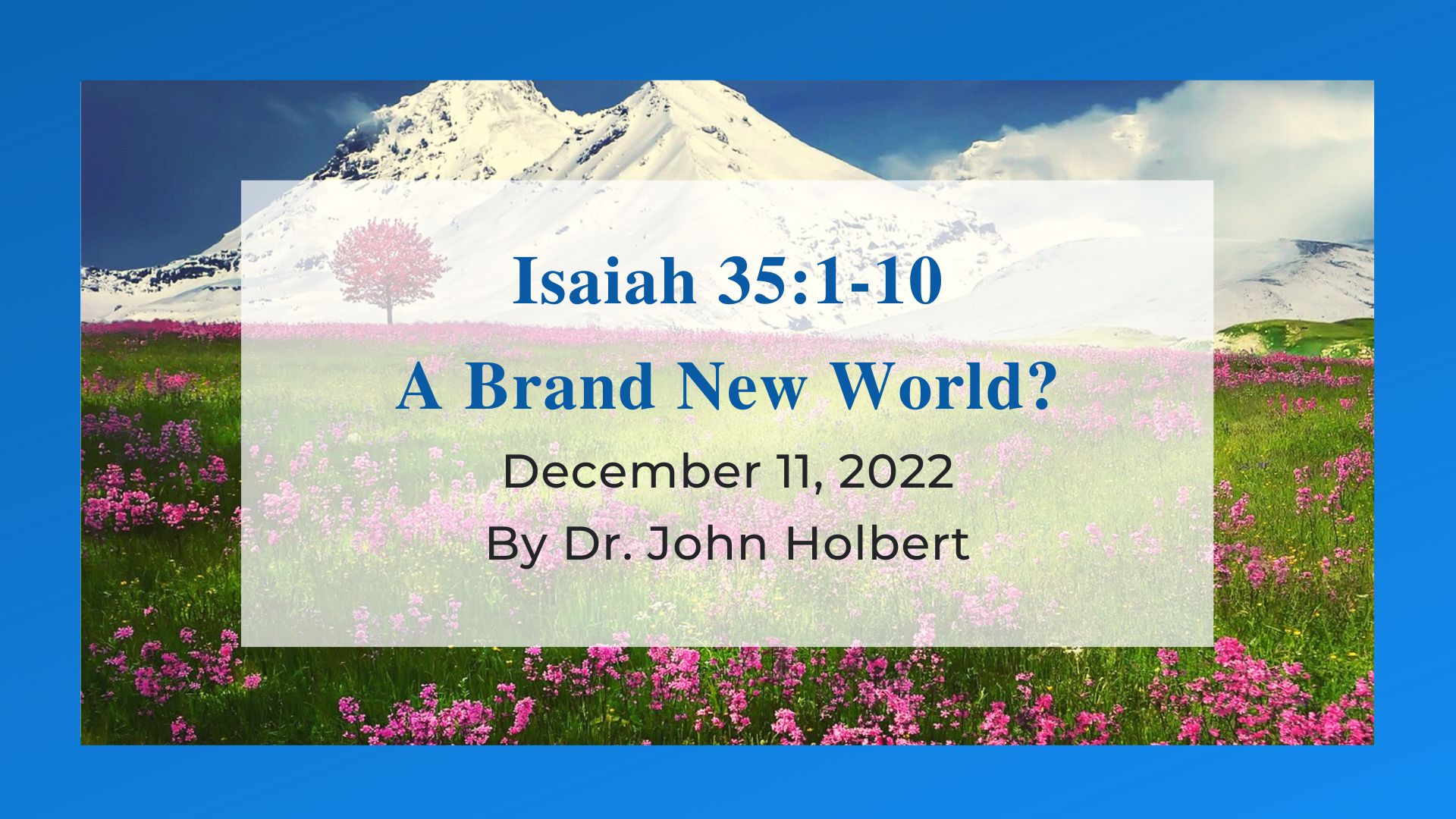A Brand New World? - Reflections on Isaiah 35:1-10
by Dr. John Holbert on Wednesday, December 7, 2022

A Brand New World?
Isaiah 35:1-10
The Peripatetic Hebrew Bible Preacher
Thus far in the first two Sundays of Advent in this year 2022, we have witnessed the hope of a thoroughly changed world because of the expectations generated by the coming of Jesus. We are told that war and the making of weapons will end and that the earth itself will yield new configurations of animal behavior, as wolves rest with sheep and lions munch on straw like oxen. These startling images hark back to the astonishing claim in Gen.1:30 that the original creation of God was marked by vegetarianism, and the eating of meat did not occur until after the collapse of that creation due to human sin (Gen.9:3). The fact that some of God’s creatures must die in order that humans may consume them is a sign that the order of things, as proclaimed by God, is not as it should be.
This third Sunday in Advent continues the vivid descriptions that the world we currently see is not what God had in mind in creation, and that a new world is on its way. In this new world, “deserts will rejoice and bloom” in the face of the glory of YHWH (Is.35:1-2), “the weak will be strengthened,” the fearful will be protected from fear” (Is.35:3-4). In addition, the sad human realities of this world will be altered: blind eyes opened, deaf ears unstopped, lame ones leap and dance, the mute sing for joy (Is.35:5-6). And these changed humans will live in a vastly different and deeply pleasurable landscape, waters bursting in the dry desert, hot sands changed to pools, deadly dry places offering springs of water, jackals land places of rest, scrub grass now watery reeds and rushes (Is.35:6-7).
And there will be a highway there called “Holy Way,” made for God’s people, where no one, not even the most foolish will ever lose their way (Is.35:8). On this highway there will not be any lions, no kinds of ravenous beasts, but only God’s saved people shall walk there in safety (Is.35:9). And these people of God shall come to Zion, to Jerusalem, with singing, banded with eternal joy and gladness, while any sorrow and sighing will fly away (Is.35:10).
Such powerful and unforgettable images, the sources of artistic representations for countless centuries, the origins of music and dance and sermons uncountable! Yet, given all that joy and gladness, all that talk of a new world filled with fresh human flourishing in landscapes devoid of traditional dangers, there is of course that niggling and persistent question: really? Will God somehow bring about these wonders, and if so when, and if so how? Will my blind brother-in-law, whose name is Phil, actually see again? Will my dancing wife, plagued with surgically implanted rods and screws, actually once again leap and dance with joy? Will my friend Jack, whose hearing is badly impaired, once again hear clearly? Will lions really give up their taste for fresh meat and happily chew on straw for sustenance? Will Subsaharan Africa, where climate-driven desertification continues with rapidity, suddenly burst out with water, thus saving those many humans and animals who now find thirst their deepest worry? Can the coming of Jesus at Christmas work these fabulous miracles?
We rational Christians, in the face of these texts, must in the end say no—we simply cannot expect to see these wonderful occurrences happen, no matter how fervent our faith, no matter how grand our desires. If that is so, then what is the point? Why should we read these texts year after year, light our candles, and stare dewey-eyed at the manger scene with its plastic donkey, its youthful Mary stand-in (just Fred and John’s daughter after all), and its tiny winged angel children hovering near the poorly painted star? I think we do this reading, this singing, this reciting, this playacting because we just know that the world we have created is simply not the world God had in mind when God created it. God had no desire for a world of violence and greed, a world of vast distinctions of wealth and status, a world where the color of skin can determine how much access one has to the goods and services of a society. Every year, “we need a little Christmas,” a Christmas where we can envision an end to war, an end to divisions, an end to endless violence and horror. These ancient images from Isaiah are not unfulfilled miracles waiting to happen. They are instead goaded toward another way to see and live in the world. We do not need actually to see wolves and lambs lounging peacefully on green hillsides to continue to work for the day when all of God’s creatures will have places to rest, where all of God’s creatures are not threatened by slavery, by poaching, by useless work, by hopeless cycles of dread and want.
Advent points us to another sort of life in another sort of world. The baby in the manger is a sign that God has not given up on the world after all, but urges all to gaze at the child’s face and then set about making life better for others of God’s creatures. My brother-in-law will still be blind after this Christmas has ended, but I can dedicate a part of my life to offer him something of my sight to make his way safer, more hopeful, a true Holy Way, as promised by the child at Bethlehem.
